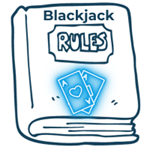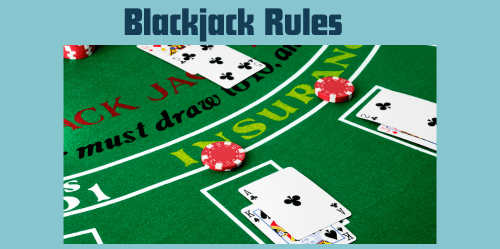Updated on: February 15th, 2024
Blackjack rules introduce you to the world of skill and strategy in a thrilling card game. In this guide, you’ll uncover the fundamental rules and tactics that can lead you to victory.
victory.
From understanding card values to making strategic decisions, we’ll walk you through the essentials of gameplay. Whether you’re a newcomer or a seasoned player, mastering these rules will empower you to take on the dealer with confidence. Get ready to play better blackjack and relish the satisfaction of defeating your opponents at the poker table.
Best Blackjack Casinos
1

$3000 Bonus + 300 Free Spins
Minimum Deposit: $20
2

$750 Bonus + 200 Free Spins
Minimum Deposit: $15
3
New Casino

$3000 Bonus + 100 Free Spins
Minimum Deposit: $20
4

$5,500 Bonus + 125 Free Spins
Minimum Deposit: $20
New Casino

5
18+. New players only. Welcome Offer – $6750 + 250 Free Spins. This bonus only applies for deposits of $20 or higher! 98% Payout.
New Casino 
6
$750 Bonus + 200 Free Spins
18+. New players only. Welcome Offer – $750 Bonus. This bonus only applies for deposits of $30 or higher! 98% Payout.

7
$6000 Bonus + 250 Free Spins
18+. New players only. Welcome Offer – $6000 Bonus + 250 Free Spins. This bonus only applies for deposits of $15or higher! 98% Payout.
New Casino

8
18+. New players only. Welcome Offer – $1850 + 500 Free spins. This bonus only applies for deposits of $20 or higher! 98% Payout.
Exclusive

9
$1200 Bonus + 300 Free Spins
18+. New players only. Welcome Offer – $1200 Bonus. This bonus only applies for deposits of $30 or higher! 98% Payout.

10
18+. New players only. Welcome Offer – $4,000 Bonus + 250 Free Spins. This bonus only applies for deposits of $10 or higher! 98% Payout.

11
$10,000 Bonus + 100 Free Spins
18+. New players only. Welcome Offer – $10,000 Bonus. This bonus only applies for deposits of $20 or higher! 99% Payout.
New Casino

12
18+. New players only. Welcome Offer – $7500 + 350 Free Spins. This bonus only applies for deposits of $20 or higher! 98% Payout.

13
$10.000 Bonus + 100 Free Spins
18+. New players only. Welcome Offer – $10,000 Bonus + 100 Free Spins. This bonus only applies for deposits of $30 or higher! 99% Payout.

14
$5,000 Bonus +75 Free Spins.
18+. New players only. Welcome Offer – $5000 Bonus. This bonus only applies for deposits of $10 or higher! 99% Payout.

15
$5000 Bonus + 300 Free Spins
18+. New players only. Welcome Offer – $5000 Bonus. This bonus only applies for deposits of $30 or higher! 98% Payout.

16
$4500 Bonus + 225 Free Spins
18+. New players only. Welcome Offer – $4500 Bonus. This bonus only applies for deposits of $20 or higher! 98% Payout.
New Casino 
17
18+. New players only. Welcome Offer – $5000 Bonus. This bonus only applies for deposits of $30 or higher! 98% Payout.

18
$750 Bonus + 200 Free Spins
18+. New players only. Welcome Offer – $750 Bonus. This bonus only applies for deposits of $30 or higher! 98% Payout.

19
18+. New players only. Welcome Offer – $2000 Bonus + 200 Free Spins. This bonus only applies for deposits of $20 or higher! 98% Payout.

20
$9000 Bonus + 200 Free Spins
18+. New players only. Welcome Offer – up to $9,000. This bonus only applies for deposits of $20 or higher! 97% Payout.

21
$750 Bonus + 200 Free Spins
18+. New players only. Welcome Offer – up to $750. This bonus only applies for deposits of $30 or higher! 98% Payout.

22
$6000 Bonus + 100 Free Spins
18+. New players only. Welcome Offer – up to $6000. This bonus only applies for deposits of $20 or higher! 99% Payout.

23
$2000 Bonus + 200 Free Spins
18+. New players only. Welcome Offer – $2000 Bonus + 200 Free Spins. This bonus only applies for deposits of $30 or higher! 99% Payout.
Exclusive 
24
$1670 Bonus + 600 Free Spins
18+. New players only. Welcome Offer – up to $1,670. This bonus only applies for deposits of $25 or higher! 98% Payout.

25
18+. New players only. Welcome Offer – $750 +110 Free Spins. This bonus only applies for deposits of $20 or higher! 98% Payout.

26
$1500 Bonus + 100 Free Spins
18+. New players only. Welcome Offer – $1500. This bonus only applies for deposits of $20 or higher! 98% Payout.
New Casino

27
18+. New players only. Welcome Offer – $3,000 Bonus. This bonus only applies for deposits of $20 or higher! 98% Payout.
Exclusive

28
$4000 Bonus + 400 Free Spins
18+. New players only. Welcome Offer – $4000 Bonus. This bonus only applies for deposits of $30 or higher! 99% Payout.

29
$10,000 Bonus + 100 Free Spins
18+. New players only. Welcome Offer – $10,000 Bonus. This bonus only applies for deposits of $30 or higher! 99% Payout.

30
$7000 Bonus + 300 Free Spins
18+. New players only. Welcome Offer – $7000 Bonus. This bonus only applies for deposits of $20 or higher! 98% payout.

31
$10.000 Bonus + 500 Free Spins
18+. New players only. Welcome Offer – $4000 Bonus. This bonus only applies for deposits of $30 or higher! 98% Payout.

32
$500 Bonus + 100 Free Spins
Min Deposit: $15
18+. New players only. Welcome Offer – $500 Bonus. This bonus only applies for deposits of $15 or higher! 98% Payout.

33
18+. New players only. Welcome Offer – $5000 Match. This bonus only applies for deposits of $20 or higher! 97% Payout.
New Offer 
34
$750 Bonus + 200 Free Spins
Min Deposit: $15
18+. New players only. Welcome Offer – $750 Bonus + 200 Free Spins. This bonus only applies for deposits of $15 or higher! 98% Payout.

35
$7500 Bonus + 550 Free Spins
18+. New players only. Welcome Offer – $7500 Bonus. This bonus only applies for deposits of $30 or higher! 97% Payout.

36
$5000 Bonus + 300 Free Spins
18+. New players only. Welcome Offer – $5000 Bonus. This bonus only applies for deposits of $20 or higher! 98% Payout.

37
$4000 Bonus + 150 Free Spins
18+. New players only. Welcome Offer – up to $4000. This bonus only applies for deposits of $30 or higher! 98% Payout.

38
$10,000 Bonus + 200 Free Spins
18+. New players only. Welcome Offer – $10,000 Bonus. This bonus only applies for deposits of $30 or higher! 99% Payout.
New Casino 
39
18+. New players only. Welcome Offer – $4,000 Bonus + 475 Free Spins. This bonus only applies for deposits of $30 or higher! 98% Payout.

40
$1200 Bonus + 75 Free Spins
18+. New players only. Welcome Offer – $1200 Bonus. This bonus only applies for deposits of $10 or higher! 98% Payout.

41
$7000 Bonus + 250 Free Spins
18+. New players only. Welcome Offer – Bonus up to $7,000. This bonus only applies for deposits of $20 or higher! 98% Payout.

42
$8000 Bonus + 700 Free Spins
18+. New players only. Welcome Offer – Bonus up to $8,000. This bonus only applies for deposits of $30 or higher! 98% Payout.

43
$5000 Bonus + 350 Free Spins
18+. New players only. Welcome Offer – $5000 Bonus. This bonus only applies for deposits of $15 or higher! 98% Payout.

44
$1500 Bonus + 50 Free Spins
18+. New players only. Welcome Offer – up to $1500 Bonus. This bonus only applies for deposits of $30 or higher! 98% Payout.

45
$1500 Bonus + 100 Free Spins
18+. New players only. Welcome Offer – $1500 Bonus + 100 Free Spins. This bonus only applies for deposits of $20 or higher! 98% Payout.

46
18+. New players only. Welcome Offer – $10,000 +150 Free Spins. This bonus only applies for deposits of $30 or higher! 98% Payout.

47
$6,000 Bonus + 200 Free Spins
18+. New players only. Welcome Offer – $6,000. This bonus only applies for deposits of $20 or higher! 97% Payout.

48
18+. New players only. Welcome Offer – $4000 +300 Free Spins. This bonus only applies for deposits of $15 or higher! 97% Payout.

49
18+. New players only. Welcome Offer – up to $14,000. This bonus only applies for deposits of $20 or higher! 98% Payout.

50
18+. New players only. Welcome Offer – $7500 Bonus. This bonus only applies for deposits of $20 or higher! 99% Payout.

51
$1500 Bonus + 200 Free Spins
Min Deposit: $15
18+. New players only. Welcome Offer – $1500 Bonus + 200 Free Spins. This bonus only applies for deposits of $15 or higher! 98% Payout.

52
$3000 Bonus + 100 Free Spins
18+. New players only. Welcome Offer – up to $3000. This bonus only applies for deposits of $20 or higher! 97% Payout.

53
$3000 Bonus + 200 Free Spins
18+. New players only. Welcome Offer – $3000 Bonus. This bonus only applies for deposits of $30 or higher! 98% Payout.

54
$3000 Bonus + 225 Free Spins
18+. New players only. Welcome Offer – $3000 Bonus. This bonus only applies for deposits of $30 or higher! 98% Payout.

55
$400 Bonus + 200 Free Spins
18+. New players only. Welcome Offer – $400 Bonus. This bonus only applies for deposits of $10 or higher! 98% Payout.

56
$1250 Bonus + 75 Free Spins
18+. New players only. Welcome Offer – $1250 Bonus. This bonus only applies for deposits of $20 or higher! 98% Payout.

57
$3500 Bonus + 100 Free Spins
18+. New players only. Welcome Offer – $3500 Bonus. This bonus only applies for deposits of $20 or higher! 98% Payout.

58
$30,450 Bonus + 100 Free Spins
18+. New players only. Welcome Offer – $30,450 Bonus. This bonus only applies for deposits of $20 or higher! 98% Payout.

59
$1500 Bonus + 100 Free Spins
3 Other Bonuses!
18+. New players only. Welcome Offer – $1500 Bonus. This bonus only applies for deposits of $10 or higher! 98% Payout.

60
$3500 Bonus + 350 Free Spins
18+. New players only. Welcome Offer – up to $3500. This bonus only applies for deposits of $10 or higher! 97% Payout.

61
$1500 Bonus + 500 Free Spins
18+. New players only. Welcome Offer – $1,500. This bonus only applies for deposits of $20 or higher! 98% Payout.

62
$1200 Bonus + 150 Free Spins
Min Deposit: $25
18+. New players only. Welcome Offer – up to $1,200. This bonus only applies for deposits of $25 or higher! 98% Payout.

63
18+. New players only. Welcome Offer – 160% Bonus. This bonus only applies for deposits of $20 or higher! 98% Payout.

64
18+. New players only. Welcome Offer – up to $2,500, for 2nd, for 3rd. This bonus only applies for deposits of $25 or higher! 98% Payout.

65
$1650 Bonus + 250 Free Spins
18+. New players only. Welcome Offer – Get up to $1650. This bonus only applies for deposits of $20 or higher! 99% Payout.

66
$8000 Bonus + 250 Free Spins
18+. New players only. Welcome Offer – up to $8000. This bonus only applies for deposits of $20 or higher! 98% Payout.

67
18+. New players only. Welcome Offer – 250%. This bonus only applies for deposits of $20 or higher! 98% Payout.

68
$10,000 Bonus + 100 Free Spins
18+. New players only. Welcome Offer – up to $10,000. This bonus only applies for deposits of $20 or higher! 98% Payout.

69
$3000 Bonus + 350 Free Spins
18+. New players only. Welcome Offer – up to $3000. This bonus only applies for deposits of $25 or higher! 98% Payout.

70
$5000 Bonus + 300 Free Spins
18+. New players only. Welcome Offer – $5000 Bonus. This bonus only applies for deposits of $10 or higher! 98% Payout.

71
$600 Bonus + 100 Free Spins
Min Deposit: $15
18+. New players only. Welcome Offer – up to $4,000 + 40 Free Spins. This bonus only applies for deposits of $20 or higher! 98% Payout.

72
$15,000 Bonus + 225 Free Spins
18+. New players only. Welcome Offer – up to $15,000. This bonus only applies for deposits of $20 or higher! 98% Payout.

73
$5000 Bonus + 100 Free Spins
18+. New players only. Welcome Offer – up to $5000. This bonus only applies for deposits of $10 or higher! 97% Payout.

74
$3000 Bonus + 100 Free Spins
18+. New players only. Welcome Offer – up to $3000. This bonus only applies for deposits of $15 or higher! 98% Payout.

75
$2500 Bonus + 200 Free Spins
Min Deposit: $15
18+. New players only. Welcome Offer – $2500, can be claimed 5x. This bonus only applies for deposits of $15 or higher! 98% Payout.

76
$4500 Bonus + 225 Free Spins
18+. New players only. Welcome Offer – $4500 Bonus + 225 Free Spins. This bonus only applies for deposits of $20 or higher! 98% Payout.

77
$400 Bonus + 100 Free Spins
18+. New players only. Welcome Offer – Bonus up to $400, can be claimed 5x. This bonus only applies for deposits of $20 or higher! 96% Payout.

78
$6000 Bonus + 100 Free Spins
Min Deposit: $25
18+. New players only. Welcome Offer – up to $6000. This bonus only applies for deposits of $25 or higher! 98% Payout.

79
$10,000 Bonus + 200 Free Spins
18+. New players only. Welcome Offer – up to $10,000. This bonus only applies for deposits of $20 or higher! 98% Payout.

80
$1000 Bonus + 50 Free Spins
18+. New players only. Welcome Offer – up to $1,000. This bonus only applies for deposits of $10 or higher! 98% Payout.
18+. New players only. Welcome Offer – Bonus up to $2000. This bonus only applies for deposits of $20 or higher! 98% Payout.

82
$2500 Bonus + 500 Free Spins
18+. New players only. Welcome Offer – up to $2500. This bonus only applies for deposits of $20 or higher! 98% Payout.

83
$4000 Bonus + 300 Free Spins
18+. New players only. Welcome Offer – up to $4,000. This bonus only applies for deposits of $20 or higher! 98% Payout.

84
$750 Bonus + 110 Free Spins
18+. New players only. Welcome Offer – $750 Bonus + 110 Free Spins This bonus only applies for deposits of $10 or higher! 98% Payout.

85
300% Bonus +250 Free Spins
18+. New players only. Welcome Offer – 300% Bonus +250 Free Spins. This bonus only applies for deposits of $25 or higher! 98% Payout.

86
$2500 Bonus + 120 Free Spins
18+. New players only. Welcome Offer – $2500 Bonus + 120 Free Spins. This bonus only applies for deposits of $10 or higher! 98% Payout.

87
$14,000 Bonus + 100 Free Spins
18+. New players only. Welcome Offer – $14,000 Bonus + 200 Free Spins. This bonus only applies for deposits of $10 or higher! 98% Payout. Bonus Code: 7DAYWELCOME200

88
$38,000 Bonus + 300 Free Spins
Deposit: 0.0001BTC
18+. New players only. Welcome Offer – Bonus up to $3,000. This bonus only applies for deposits of 0.0001BTC or higher! 98% Payout.

89
18+. New players only. Welcome Offer – $12,250 Match. This bonus only applies for deposits of $20 or higher! 98% Payout.

90
$450 Bonus + 250 Free Spins
Min Deposit: $25
18+. New players only. Welcome Offer – $450 Bonus + 250 Free Spins. This bonus only applies for deposits of $20 or higher! 97% Payout.

91
$5000 Bonus + 100 Free Spins
18+. New players only. Welcome Offer – $5000 Bonus + 100 Free Spins. This bonus only applies for deposits of $20 or higher! 98% Payout.

92
$7500 Bonus + 100 Free Spins
18+. New players only. Welcome Offer – Bonus up to $7500, can be claimed 9x. This bonus only applies for deposits of $20 or higher! 98% Payout.

93
18+. New players only. Welcome Offer – Bonus up to $7777. This bonus only applies for deposits of $20 or higher! 97% Payout.

94
18+. New players only. Welcome Offer – Bonus up to $2,000. This bonus only applies for deposits of $20 or higher! 97% Payout.

95
$2500 Match
Min Deposit: $25
18+. New players only. Welcome Offer – 235% Bonus up to $2,500. This bonus only applies for deposits of $20 or higher! 96% Payout.

96
18+. New players only. Welcome Offer – $5000 Match. This bonus only applies for deposits of $25 or higher! Use Bonus Code: SP200

97
18+. New players only. Welcome Offer – $8,000. This bonus only applies for deposits of $20 or higher! 96% Payout.

98
$800 Bonus + 120 Free Spins
18+. New players only. Welcome Offer – $800 Bonus + 120 Free Spins. This bonus only applies for deposits of $25 or higher! 98% Payout.

99
18+. New players only. Welcome Offer – Bonus up to $1,500. This bonus only applies for deposits of $20 or higher! 98% Payout.

100
18+. New players only. Welcome Offer – $1000 Match. This bonus only applies for deposits of $20 or higher! 97% Payout.

101
18+. New players only. Welcome Offer – up to $8888. This bonus only applies for deposits of $20 or higher! 97% Payout.

102
$2500 Bonus + 500 Free Spins
18+. New players only. Welcome Offer – Bonus up to $2500. This bonus only applies for deposits of $20 or higher! 97% Payout.

103
750% Bonus + 110 Free Spins
18+. New players only. Welcome Offer – 750% Bonus + 110 Free Spins. This bonus only applies for deposits of $20 or higher! 98% Payout.

104
18+. New players only. Welcome Offer – 750% Bonus. This bonus only applies for deposits of $20 or higher! 98% Payout.

105
18+. New players only. Welcome Offer – 750% + 110 Free Spins. This bonus only applies for deposits of $25 or higher! 98% Payout.

106
$12,500 Bonus + 55 Free Spins
18+. New players only. Welcome Offer – $12,500 Bonus + 55 Free Spins. This bonus only applies for deposits of $20 or higher! 97% Payout.

107
18+. New players only. Welcome Offer – $4500 Bonus. This bonus only applies for deposits of $20 or higher! 97% Payout.

108
18+. New players only. Welcome Offer – $4500 Match + 250 Free Spins. This bonus only applies for deposits of $20 or higher! 97% Payout.

109
18+. New players only. Welcome Offer – $1000 Match. This bonus only applies for deposits of $20 or higher! 97% Payout.

110
18+. New players only. Welcome Offer – $1000 Match. This bonus only applies for deposits of $20 or higher! 97% Payout.

111
18+. New players only. Welcome Offer – $1000 Match. This bonus only applies for deposits of $20 or higher! 97% Payout.

112
18+. New players only. Welcome Offer – $800 Match. This bonus only applies for deposits of $20 or higher! 97% Payout.

113
18+. New players only. Welcome Offer – $1500 Match. This bonus only applies for deposits of $20 or higher! 97% Payout.

114
18+. New players only. Welcome Offer – $1000 Bonus. This bonus only applies for deposits of $10 or higher! 97% Payout.
More Online Casinos
Basic Blackjack Rules
Players aim to beat the dealer by achieving a hand total nearer to 21 without exceeding it in the game also known as 21. Here’s a comprehensive overview of the basic rules:
Card Values
- Numbered cards (2-10) carry their initial value, while face cards (Jack, Queen, King) each hold a value of 10 points.
- Players can value Aces at One or eleven, offering flexibility in hand construction.
Game Setup
Each player receives two cards face up at the start of a blackjack round, while the dealer receives one card face up and another face down.
Gameplay
- Players take turns deciding whether to “hit” (receive another card) to improve their “stand” or hand. with their current hand.
- If a player’s initial two cards total 21, they achieve a “blackjack” or a “natural 21,” typically resulting in an enhanced payout.
Dealer’s Turn
- After Every player has finished their hands, dealer disclosure of their facedown card and must follow specific rules.
- The dealer must draw additional cards (“hit”) until their hand reaches a total of 17 or more. Once the dealer’s hand total is seventeen or higher, they must stand and may not draw further cards.
Losing and Winning
- In case a player’s hand exceeds 21, they “bust” and lose the round. However, if a player’s hand is nearer to 21 than the dealer’s hand without surpassing 21, The participant wins.
- In the event of a player’s hand total matching the dealer’s, it results in a “push,” and the player’s bet is returned.
Payouts
- The player typically receives an even money (1:1) payout on their bet when they win with a hand total that beats the dealer’s.
- Achieving a “blackjack” with the initial two cards often results in a higher payout, often at a 3:2 ratio.

Unique Blackjack Rules
There are several unique variations and optional rules that can spice up the game. Here are a few of the unique blackjack rules and variations that you might encounter:
Double Down Rescue
Some casinos offer a “Double Down Rescue” option, allowing players to surrender their double down bet if they feel their hand is weak, providing a safety net for players who have doubled down on a less-than-ideal hand.
Super Fun 21
In this variant, a player’s blackjack always beats the dealer’s blackjack. Players can double down at any time, even after splitting, and can also surrender their hand to get half of their bet back.
Spanish 21
Spanish 21 is played with a Spanish deck, which consists of 48 cards as all 10s are removed. Players have more options, including the ability to split a hand up to three times and the chance to double down on any number of cards.
Double Exposure Blackjack
In this variant, also known as “Face Up 21,” both dealer’s cards are dealt face up, giving players an advantage in making their decisions. However, blackjack only pays even money in this variant.
Blackjack Switch
In this unique version, players receive two hands and have the option to switch the second card of each hand if they believe it will improve their chances. However, a dealer’s 22 results in a push against any player hand of 21 or less.
No-Hole-Card Rule
In some European blackjack games, dealers do not take a hole card. This means that if the dealer gets a blackjack, players lose all their bets, including doubles and splits, regardless of their own hand outcomes.
Surrender Option
Some blackjack games offer a “surrender” option, allowing players to give up their hand and lose only half of their bet, serving as an effective strategy when facing a particularly strong dealer hand.
Strategies in Blackjack
These fundamental strategies can significantly improve your odds of winning in Blackjack:
Hit or Stand
- If the dealer’s face-up card is 7 or higher, and your hand totals 12-16, you should hit.
- If the dealer’s face-up card is 6 or lower, and your hand totals 12-16, you should stand.
- You should always stand if your hand totals seventeen or higher.
Doubling Down
- You should double down if your hand totals 11 unless the dealer’s face-up card is an ace.
- With a total of 10, you should double down unless the dealer’s face-up card is a 10 or an ace.
Splitting Pairs
- Always split aces and 8s.
- Never split 5s and 10s.
Surrender
If available, surrender hard 16 (but not 8-8) against the dealer’s 9, 10, or ace, and hard 15 against the dealer’s 10.
More Blackjack Guides
Blackjack Rules-FAQs
In blackjack, the goal is to beat the dealer’s hand without going over 21. Players receive two cards and can choose to “hit” (take another card) or “stand” (keep their current hand).
The value of a hand is the sum of the individual card values. Number cards are worth their initial value, face cards are worth 10, and Aces can be worth One or eleven.
Players can split pairs of cards of the same value and double down by placing an additional bet and receiving one more card.
The standard payout for a blackjack is 3:2, meaning a player wins 1.5 times their bet if they have a blackjack.
You can learn basic blackjack strategy through study and practice, including using strategy charts and playing in free or low-stakes games to hone your skills.
 victory.
victory.


































































































































